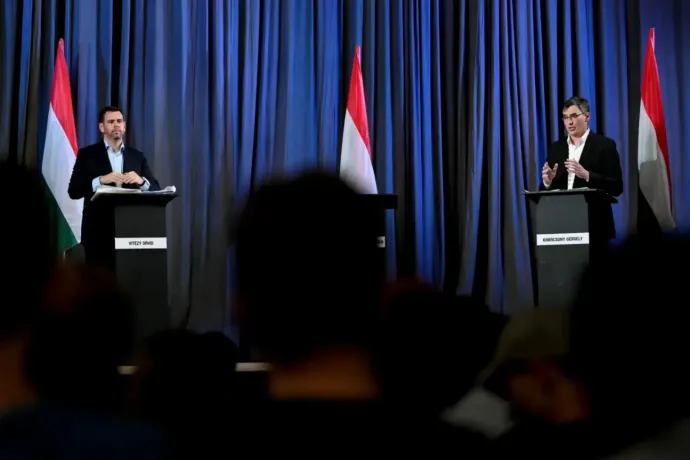Curia orders recount of all valid votes in election for mayor of Budapest
July 08. 2024. – 09:58 AM
updated

The Curia has ordered the recount of all votes cast in the mayoral election in Hungary's capital. The decision was published on the Curia's website and states that in accordance with the decision “the body is ordering that all votes deemed valid in the mayoral election should be reexamined and recounted, after which the result of the mayoral election should be finalized.”
The recount will determine who will become mayor of Budapest.
"No further appeal against the ruling is possible," they wrote. The Curia's decision comes after the Constitutional Court ruled in favour of Dávid Vitézy's constitutional complaint, thereby annulling the previous decision of the Curia which had upheld the decision of the National Election Committee, declaring Gergely Karácsony's victory. The decision of the Constitutional Court meant that the Curia had to repeat its proceedings and issue a new decision.
Dávid Vitézy, who ran against Karácsony had sought to have the Curia reverse the decision of the National Election Committee and order a recount of valid votes in all polling stations in the capital. He asked for a re-run of the elections in districts IV and VII because the name of Alexandra Szentkirályi who had withdrawn from the race at the last minute was crossed out with very thin lines on the ballots in those districts. In its judgment, the Curia found the first petition to be unfounded and the second petition to be unjustified. The LMP-supported candidate for mayor subsequently filed a constitutional complaint.
How did we get to this point?
On 9 June, Gergely Karácsony, the candidate for mayor nominated by DK-MSZP-Parbeszéd and Momentum, won the mayoral election by 324 votes. In addition to the valid votes, there were officially 24 589 ( in reality only 23 926) invalid votes cast as well. It is for this very reason that Dávid Vitézy stated even before the final result was announced that he would definitely initiate a recount.
Three days later, on 12 June, Vitézy filed his appeal with the Budapest Election Committee, prior to which he explained his legal concerns in detail. He said that he had evidence from 202 polling stations in 20 districts that the counting officers had incorrectly declared votes invalid. His team also alleged "systemic irregularities" because they believed there may have been intentionality in crossing out Alexandra Szentkirályi's name on the ballots in the IV and VII districts with just a thin line.
The National Election Committee did not wait long to decide:
They ordered a recount of the invalid votes on the evening the appeal had been lodged.
Gergely Karácsony responded by saying that Vitézy was relying on the votes of those who had cast a vote for both him and Alexandra Szentkirályi, whose name had been crossed out on the ballot. The mayor also criticised the speed with which the recount was ordered and the way the invalid votes were delivered to the National Election Office, saying that the integrity of the recount had not been guaranteed in several places.
Gergely Karácsony then announced that whatever the result of the recount, he would contest it and ask for a rerun of the election for mayor.
The National Election Committee recounted the invalid votes on 15 June, which reduced Karácsony's lead over Vitézy. The final result of the election remained unchanged, with Karácsony winning by 41 votes, and remaining mayor of Budapest.
The decision was challenged by both the winner, Gergely Karácsony and Dávid Vitézy.
Both candidates challenged the result at the Curia officially too, two days later:
Karácsony asked for a rerun of the entire mayoral election, while Vitézy wanted a recount in the IV and VII districts because of Szentkirályi's name being crossed out on the ballots with only a thin line. In the end, the Curia rejected both appeals in a single decision and upheld the final result of the election. The Curia ruled that the requests were not sufficiently substantiated. Karácsony then announced that he would accept the courts' ruling, that he would be mayor for the next five years and that he would not resign even after the new assembly has convened in October.
Vitézy, however, said that his team would examine the Curia's decision, and did not rule out filing a constitutional complaint. The candidate later submitted a 17-page complaint, in which he asked the Constitutional Court to declare the Curia's decision unconstitutional and annul it. He justified his decision by stating that he would use all available means of legal redress, and that this complaint was the last instrument available.
On 4 July, Karácsony submitted a so-called amicus curiae opinion to the Constitutional Court, in which he basically argued why the Constitutional Court should reject Dávid Vitézy's constitutional complaint about the election for mayor, which he had lodged the week before.
Reacting to the Curia’s decision, Gergely Karácsony wrote: "The National Election Committee has six days to recount thirty-two times as many ballot papers as it counted in one day the last time when it was recounting invalid ballots. One can only hope that chaos will not ensue.
But let there be a recount. However there must be strong guarantees"
Dávid Vitézy welcomed the decision, and said that "it would have been good if there hadn't been "so many redress steps and so much time needed" for a full recount", and added that "such a close result leads to a full recount in any democracy".
For more quick, accurate and impartial news from and about Hungary, subscribe to the Telex English newsletter!